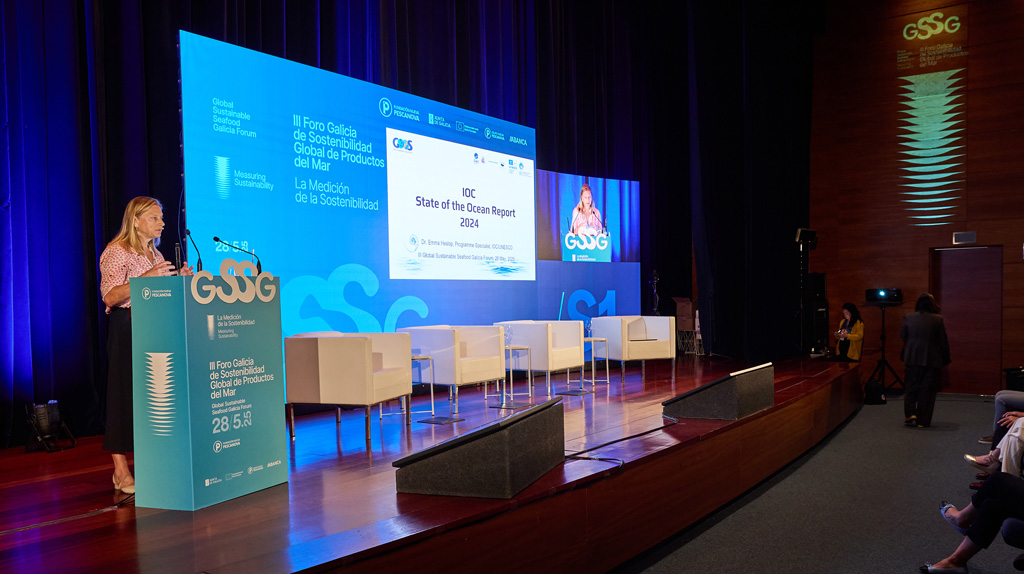Emma Heslop, from the IOC-UNESCO Global Ocean Observing System program, highlighted crucial findings from this biennial report.
The Sea Councilor, Alfonso Villares; the Mayor of Vigo, Abel Caballero; the Director General of Fisheries Management and Aquaculture, Aurora de Blas, and the President of the Nueva Pescanova Foundation, José María Benavent, inaugurated the third edition of the Global Sustainable Seafood Galicia Forum (GSSG), held at the Afundación headquarters in Vigo.
Under the theme Measuring Sustainability, the third GSSG Forum welcomed 350 attendees (both in person and online) from 30 countries, surpassing the previous edition’s numbers and solidifying its place as a key event in sustainability discussions within the fishing and aquaculture sector.
During the inauguration, and in front of numerous representatives from institutions, organizations, and companies in the sector, the Sea Councilor, Alfonso Villares, emphasized the importance of sustainability in the industry. He announced that the Galician government would advocate in Brussels for a review of the Common Fisheries Policy, “so that it maintains a balance between environmental, economic, and social factors, resulting in a fisheries management that realistically addresses the sector’s current challenges.”
The Mayor of Vigo, Abel Caballero, stated: “We must transform our research and global activities into a means to shape the future of this planet,” and stressed the importance of “listening to scientists.”
For his part, the President of the Nueva Pescanova Foundation, José María Benavent, highlighted the importance of measurement, “which allows us to quantify progress and also understand the road ahead.” The Director General of Fisheries Management and Aquaculture, Aurora de Blas, emphasized that the Spanish fleet is “a global benchmark for sustainability and good practices.”
A multidisciplinary panel of 21 national and international experts took part in Vigo, representing institutions, associations, research entities, and leading companies within the fishing and aquaculture sector.
The experts contributed different viewpoints and perspectives on the industry’s status, priorities, and challenges in sustainability measurement. Additionally, they discussed best practices, key priorities, obstacles, and requirements for achieving standardization and simplification in measurement processes.
Active sector collaboration
The forum kicked off its sessions with the presentation of the 2024 State of the Ocean Report, delivered by Emma Heslop, a specialist from the IOC-UNESCO Global Ocean Observing System program. She highlighted crucial findings from this biennial report, developed by 98 authors from 26 countries, including Spain.
The report underscores the ocean’s critical role as a food source for an expanding global population while identifying key management areas, including increasing nitrogen and phosphorus levels in seawater, plastic pollution, ocean warming, and acidification. Additionally, it highlights risks such as tsunamis and rising sea levels.
Heslop stressed that ocean observation serves as a vital tool for risk management and future demand assessment, helping sustain industries responsibly. While there are over 8,000 observation platforms operating across 84 countries and generating 120,000 analyses daily, 75% of the ocean remains unmonitored, with a significant knowledge disparity between the northern and southern hemispheres.
Heslop commended the ongoing collaboration between IOC and fishing vessel networks in Australia and other countries for ocean data collection. She encouraged forum participants to actively engage and invited the industry to join the FVON (Fishing Vessel Observing Network) program, which facilitates data gathering through fishing fleets.
The forum proceeded with five panel discussions dedicated to sustainability measurement, featuring complementary viewpoints from NGOs, the value chain, scientific research, government institutions, and financial entities.
The European sector perspective was outlined by Antonio Basanta, policy assistant to the European Commissioner for Fisheries and Oceans. He introduced key aspects of the Oceans Pact and emphasized the urgency of revitalizing Europe’s competitiveness in fisheries management. After the sessions, GSSG Forum Co-Director Ángel Matamoro synthesized the event’s conclusions, which will be published soon.
The forum concluded with final remarks delivered by Patricia García, Director General of Fisheries, Aquaculture, and Technological Innovation at the Xunta de Galicia, alongside José María Benavent, President of the Nueva Pescanova Foundation.[/et_pb_text][/et_pb_column]
[/et_pb_row]
[/et_pb_section]
